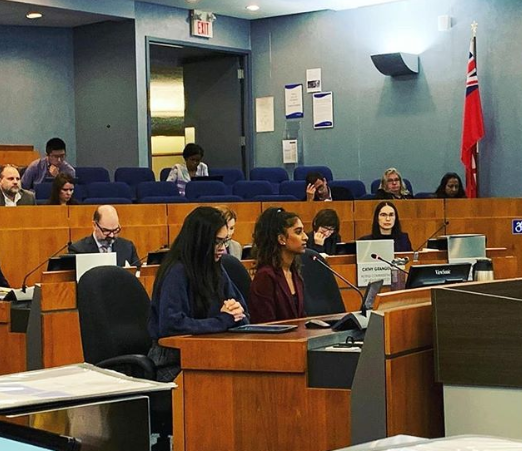Miranda Baksh is a Conservation Interpreter with Credit Valley Conservation and an Environmental Educator with the TRCA. She graduated with a Bachelor in Environmental Studies (BES) in 2016 and a Master's in Environmental Studies (MES) in 2019.
Where do you work and what do you do?
Like Marissa Chase, I’m a Conservation Interpreter with Credit Valley Conservation. I visit sites owned by the CVC. I hike the trails and do education on the go, teaching visitors about wildlife, plants, trail etiquette. There’s some enforcement as well, about rules and (with the pandemic) crowding issues. I visit about two sites a day.
I also work for the Toronto Region Conservation Authority (TRCA) at the Kortright Center, doing programs with K-12 students related to their curriculum, pond studies, hiking trails, geocaching, food chains, ecosystems, native and invasive bee species, orienteering, both in-class and outdoors.
And I am also the CEO of Peel Region’s Community Climate Council, which I co-founded towards the end of my master’s degree. I applied for a Climate Action Catalyst program and got accepted. I met four other university women from peel to create a climate action program – we met city councillors, and other leaders, and we were the delegates to propose a climate action plan at Peel. We helped organize Brampton’s first Climate Strike. The reason we did that was it didn’t make sense for people to use carbon emissions to commute to Toronto for a climate strike. We ended up having 250 people participating in the climate strike in Brampton. Today the Community Climate Council is a youth-led, non-partisan council with 25 members. Our vision is for this model to happen in other municipalities, with youth-led climate councils everywhere.
Tell us your work journey after the degree: what went well? What was challenging?
Well, I have to admit I jumped right into the Master’s program after my bachelor’s degree. So, I’ll talk about the challenges there. Going into graduate school, I thought I would have to walk in and invent something completely new. But that isn’t exactly how it works in graduate school – you can do research that is relevant to you, and you have some time to learn before you are expected to create new knowledge. Also, like many graduate students, I ended up changing my topic of study from what I had originally planned. But all of these are part of the process and I ended up doing my major paper about social media – specifically Instagram – and its uses and possibilities for messages about conservation.
How did you use what you learned? When did you feel like “I wish that they had taught me about this in university!”
I am constantly using what I learned in school, in every aspect of my work. As for what I would have wished for more of? Networking, placement opportunities – I managed to create my own experiences, but it would have been better to have more of that.
Thinking back to when you were in high school, what made you want to get into this? How does what you are doing match, and differ, from what you thought?
I always say that biology and science were my passions in high school, but they never really loved me back the same way. I also liked writing. In grade 10, we had an environmental science unit where we looked at labels on shampoo and food, the lists of chemicals that no one knows what they are.
What I liked about environmental studies was that you can get into interesting, “real world” topics right away – politics, food – whereas it looked to me like introductory science courses were so general and I would have been years away from working on applying those in the world. I also knew I wanted to work outdoors, and so far I have achieved that as well.
Any other advice for people thinking of an undergrad environmental degree?
Some things that worked for me: I worked for the TRCA while still an undergraduate. That might not be practical for everyone, but if you can work in your field while you are still in school, it will be an advantage when you finish.
Also don’t be afraid to talk to your professors, stay in touch with them, ask them for their advice, their recommendations.


